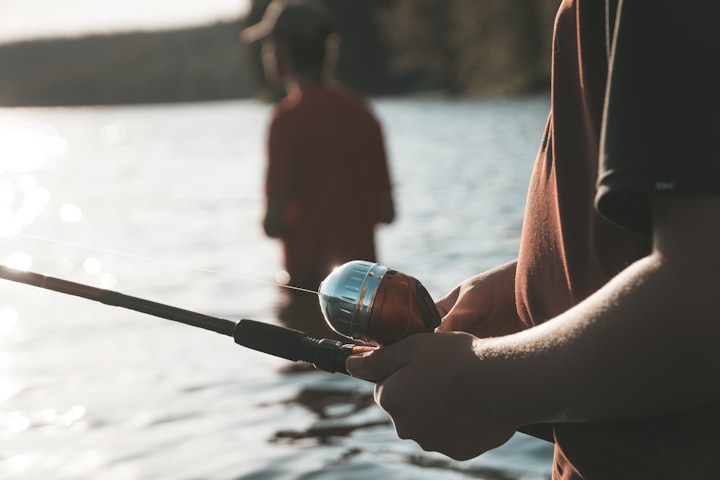Going Fishing
A story from New Domangue

Johntee never would have taken Curtis if it hadn’t been for Uncle Joseph mentioning their dad’s fishing stories. It all came out one night when Uncle Joseph got so drunk he forgot to hold back his memories, and Johntee and Curtis both got to hear about their dad in a way they had never heard before. As he guided Curtis onto the nearly empty pre-dawn bus, Johntee knew that Curtis would never have got it into his head to want to go fishing. Curtis was just a kid. He didn’t know anything. He wanted to see where their father used to fish. He wanted to fish there. What could he do, Johntee asked himself as he held the rods he’d purchased after three months of cutting grass. He’d had to get them without his mother knowing or she would’ve had his behind for it.
“This the end of the line,” the bus driver said as they reached the Orleans and Chakchiuma Parish line. The south-bound bus was empty. Johntee wished there was someone getting off with them.
“Ain’t there a bus take us to New Domangue?” Johntee asked on his way out.
“New Domangue? You going to need a car, son,” the bus driver laughed.
“What for?” Johntee asked, annoyed at the bus driver’s amusement.
“Just get walking, kid.” The bus driver laughed again, shut the door behind Johntee, and turned the bus back toward the New Orleans skyline, which could be seen in the distance jutting straight out of the flat earth, its buildings reflecting an amber-tinged morning glow.
“Don’t listen to him, Curtis. He ain’t nothing but a dumb bus driver,” Johntee said. “We’ll get a ride.”
“A ride?” Curtis shot back.
“Something wrong with that?” Johntee asked.
“What if we don’t get a ride?”
“Cut your whining,” Johntee snapped. He felt just as anxious. He looked down the empty highway. “Don’t you want to go fishing in New Domangue?”
“Not if we ain’t got no ride,” Curtis whimpered.
“Ain’t you the one wanted to find Dad’s fishing place?” Johntee asked, bearing down on his brother’s nose. There was nothing to do now but keep going, even if Curtis changed his mind.
“I don’t know anymore,” Curtis said.
Johntee turned away from his brother and began walking alongside the four-lane asphalt highway that led south to New Domangue. He stuck his thumb out toward the oncoming traffic as he’d seen movie characters do on TV and shouted to his brother to catch up. They were going to get there, Johntee thought, no matter what.
At first, traffic was slow and no one stopped. Johntee’s resolve began to waver as the sun crept into the sky. It seemed to him as if an hour had passed.
Walking in absolute silence, several paces ahead of his younger brother, with nothing but pine and oak trees on either side of the highway, Johntee entertained the thought of turning around. But even as he thought about turning back, he ordered his feet to move forward faster, told his brother to keep up, and began talking about his father’s fishing days as if he had heard the stories firsthand many times over.
In his highly colorful tales of his father’s fishing days in New Domangue, Johntee imagined a man he had never known by envisioning him as a champion fisherman who upon the very first cast of his line scooped up loads of fish. He imagined his father with such single mindedness that it didn’t strike him as fantastic when the possibility occurred to him that maybe, just maybe, they might run into the old man. They could find him somewhere along the river, his fishing rod in hand, fish-filled buckets scattered around him.
“You really think we going to catch fish like Dad used to?” asked Curtis, who fell behind every so often and had to run to catch up.
Johntee stopped and looked at his brother. “Of course we are,” he answered. “We going to New Domangue, ain’t we?”
“Yeah.”
“And Dad caught all those fish in New Domangue, right?”
“I guess so,” Curtis said. He fell quiet for a minute while he lowered his head and shuffled one foot on the loose gravel alongside the highway.
“Why you look like that?” Johntee asked.
Curtis looked up at Johntee from beneath his eyelids, his head still pointing toward the ground. “You think we’ll run into Dad?”
Johntee didn’t respond immediately. The echo of his own thoughts in his little brother’s voice made him reconsider how crazy he must be to even think that they might find his father fishing.
“I don’t know,” was all he could offer his brother.
“Ain’t it a small town?” Curtis continued.
“Yeah,” Johntee answered. “Supposed to be small enough where everybody knows you.”
“Then everybody there should know Dad, right?” Curtis asked.
“How am I supposed to know?” Johntee shrugged. “Why don’t you stop asking me so many questions so I can think about getting us there.”
A gray pickup truck slowed down as it passed them and pulled over to the side of the highway several yards ahead. Johntee and Curtis watched as an old man’s face appeared in the rear window and the truck reversed toward them. When the truck stopped, the old man beckoned at them. He looked like their uncle. Johntee and Curtis walked to the passenger side of the truck and peered into the cab from two feet away. A toothless old man with skin as dark as charcoal, a worn baseball cap, and deep blue overalls smiled at them.
“Going fishing?” the old man asked.
“Yessir,” Johntee said.
“Any particular spot?”
“We want to fish in New Domangue,” Curtis blurted as he jumped up and down in order to catch a glimpse of the old man.
“New Domangue? Why, do you know how far that is from here?”
“Yessir,” Johntee lied. All he knew was that it was south of New Orleans, just like his friend had told him, some miles after the St. Claude bus line.
“Figured you could hitch there and back, did you?”
“No, sir,” Johntee answered. “We thought there was a bus line get us there.”
“Chakchiuma Parish ain’t got no public transportation round these parts,” the old man said. “Why ya’ll coming down here, anyways? You can’t be older than twelve. Your folks know you out?”
“We got permission,” Johntee lied as he walked up to the truck and stood on his toes. “I’m fourteen, and I’m minding my little brother. We could use a ride.”
The old man paused for a second as he studied Johntee. “Well,” he said, “I guess it’s all right, if you got permission and all. I’m heading that way myself anyway. Going to visit a cousin of mine. Go on and jump in the back. Just be careful with them loose bottles back there. Don’t want you rolling out. And don’t touch nothing.”
Johntee and Curtis climbed into the back of the truck, and as they did so Curtis nudged Johntee in the ribs. “Tell him about Dad,” he said.
“You know where you heading in New Domangue?” the old man yelled back at them.
Johntee yelled back. “Our dad used to catch loads of fish in a bayou off the Mississippi River, where the fish is always sitting around waiting to get caught.”
The old man’s face appeared in the rear window again. He rubbed his cheeks and stared at them, and it made Johntee feel as if he should jump off the truck and walk back home.
“I know which place you talking about,” the old man yelled back. He turned around and drove the truck out onto the highway.
Johntee wondered why the old man had looked at them like that, like there was something wrong with them. He let the thought go, though, and held on to his younger brother, closing his eyes to the wind whipping across his face. After a minute, he opened his eyes and studied the landscape as it changed during the fifteen-minute ride. Pine and oak trees gave way to sugar-cane fields, which gave way to cattle pastures. Curtis pointed at the different colored cattle grazing lazily beneath the morning sun and asked if they were cows. They could see the Mississippi River levee, which resembled a large snake that stretched alongside the back end of the fields they passed.
A few minutes after they began to see the first houses dotting the landscape, the old man pulled alongside the road in front of a rundown store. He turned off the truck and stepped out. “Son,” he said as he looked at Johntee, “can you come here a second?”
Johntee looked at his brother with a questioning look, hesitating.
“I ain’t going to bite, boy. I got to ask you something.”
Johntee jumped out of the truck. He walked up to the old man, who looked even more like his uncle now that Johntee saw him standing.
“You ever gone fishing?”
“No, sir,” Johntee admitted.
“But you said your dad come this way fishing?”
Johntee felt something get stuck in his throat at the same time that he felt his heart go wild inside his chest. He swallowed what felt like a large lump of dry nothing and answered, “Yessir.”
The old man sighed and then smiled, his eyes directed toward the back of the truck. “Well,” he said, looking down at Johntee, “I hope you don’t plan to fish like that.”
Johntee didn’t understand.
“Go on and wait with your brother while I go in this store and get you some bait to fish with. Fish won’t get on your hook just because you throw a hook in the water. You need bait.”
Johntee didn’t answer any of Curtis’s questions after the old man went into the store. He continued to ignore him as the old man drove them to a small bayou that dumped into the Mississippi several yards ahead.
When they jumped out of the truck, Johntee walked up to the driver’s side to thank the old man.
“You know how to hook those worms?” the old man asked softly.
Johntee shook his head.
“Like this,” the old man said, showing Johntee with his fingers barely above his thighs how to grab, hook, and re-hook.
Johntee watched the silent motion of the old man’s fingers while Curtis looked out at the bayou’s banks, which were shaded by tall mangrove bushes and leafy willows.
“I don’t aim to stay in New Domangue too long,” the old man said loudly after he’d finished his demonstration.
“We’ll be all right,” Johntee said.
“I don’t doubt it. If it’s all right with you, I’ll swing back in less than an hour and join you. I only come to get something from my kin, which won’t take long. I’ll be back before your stomachs start to growl on you,” the old man said. He climbed into his truck and drove off.
“Why didn’t you ask him about Dad?” Curtis asked as the truck disappeared around a bend in the road.
“Don’t need to,” Johntee said. “He ain’t from New Domangue.”
Johntee picked up the rods and the bag of worms the old man had bought for them and led his brother across a patch of blackberry brush toward the edge of the water.
Johntee set up on a small promontory and ordered Curtis to watch as he worked the bait awkwardly onto his hook.
“That’s how you do it, Curtis,” Johntee said as he displayed a writhing worm looped onto his fishing hook. He was glad to have gotten the worm hooked without any problems.
Curtis smiled at the struggling worm. “Do it to mine,” he said.
Johntee repeated the trick while his little brother watched intently.
“Next time, I’ll do it,” Curtis said confidently.
The two brothers didn’t catch any fish before their bait ran out, but it didn’t matter to Johntee. The fact that the bait was gone each time they raised their rods was enough proof that there were plenty of fish in that bayou. If their father were there, both believed, they would have caught them all.
The two brothers stared at the water without saying anything. It could have been an eternity that they sat there looking at the rivulets below, but it was really only about five minutes. Johntee couldn’t tell how long it lasted, but it didn’t matter to him. He had come to the spot, and he and Curtis had gone fishing, had seen for themselves what it was all about. There sure were plenty of fish in that muddy little river.
The sun shot up into the middle of the sky, thinning the shadows around them. Not long after, Johntee heard the crunching of shells beneath tires and saw the old man’s truck pull up to their spot. Johntee and Curtis waved. As they gathered their rods, Johntee prepared to tell the old man how the fish had eaten all the worms right off the hooks. If their father had been there, he thought, not a single fish would have gotten away with it.
About the Creator
Lucas Díaz-Medina
I'm a Dominican immigrant living in the New Orleans area since the 70s. A father of two, I've been a service worker, war medic, ER tech, pro fundraiser, nonprofit leader, city bureaucrat, and now a PhD'd person, but always a writer.







Comments (2)
nice story
nice story